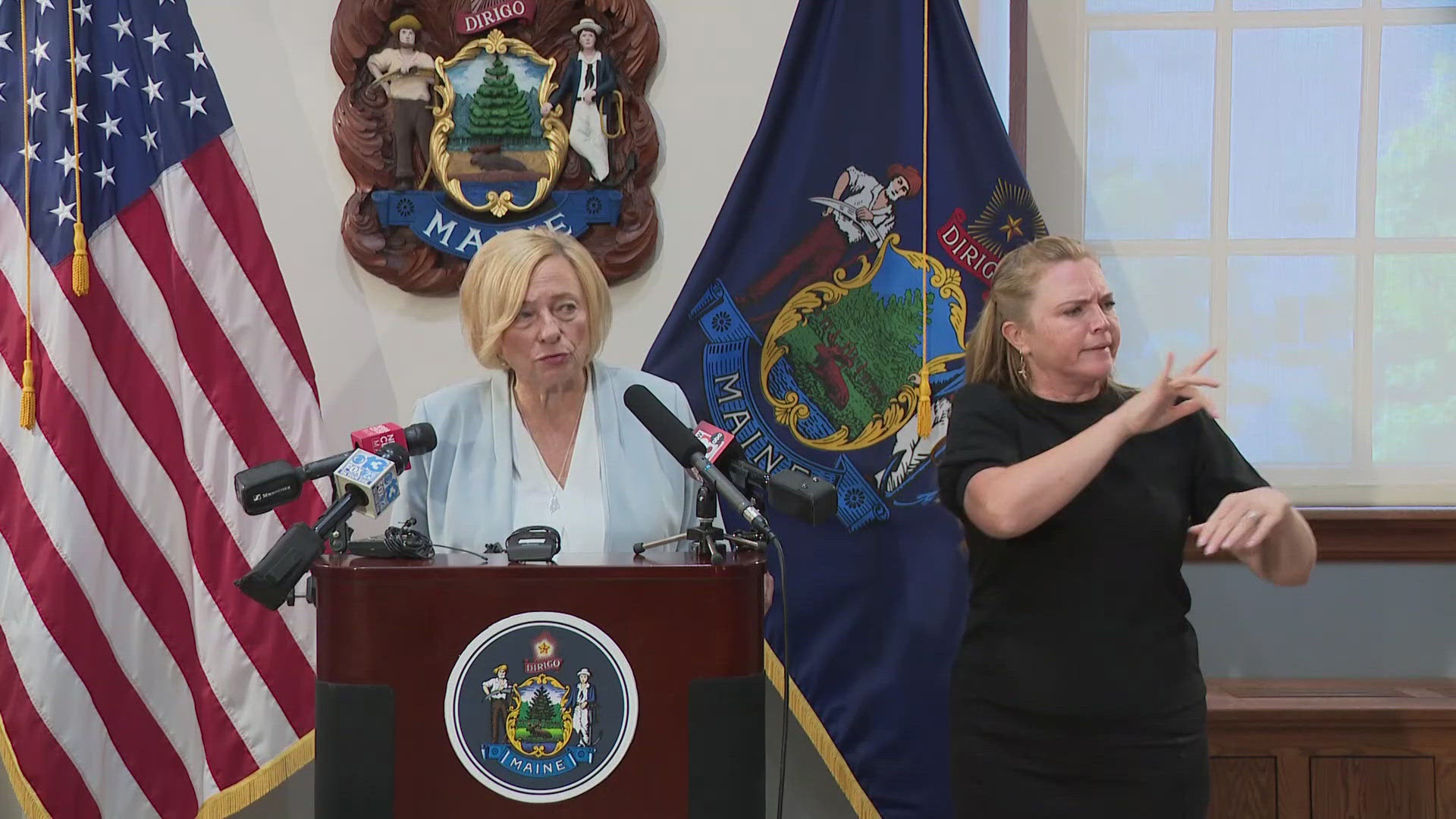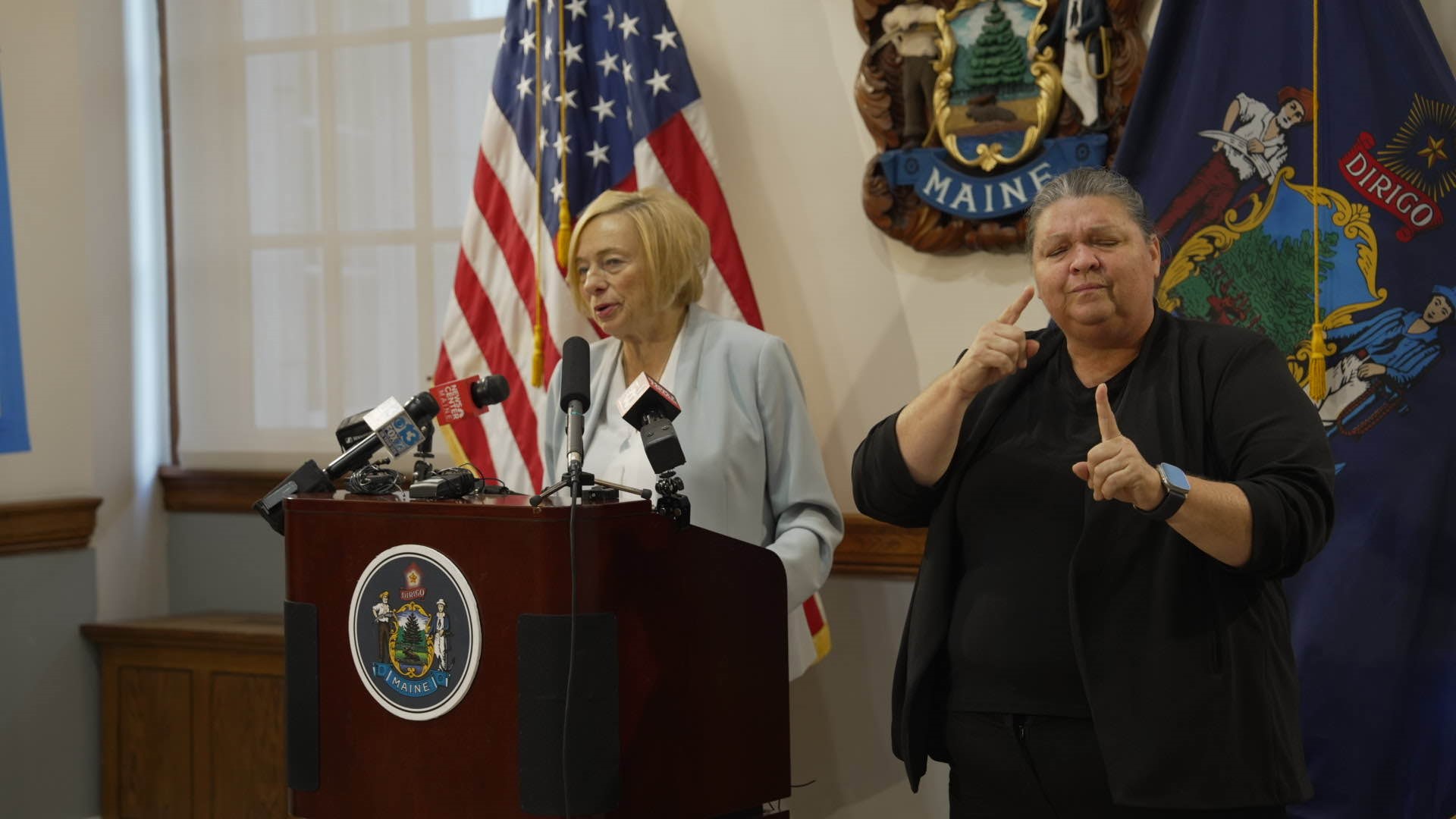AUGUSTA, Maine — Gov. Janet Mills held a press conference Friday afternoon where she delivered prepared remarks over the final report from the Independent Commission to Investigate the Facts of the Tragedy in Lewiston.
In the wake of the mass shooting on Oct. 25, when 18 people were killed and more than a dozen injured, Mills and Attorney General Aaron Frey established the independent commission with the goal of determining the facts of the shootings, including the months preceding the shootings and the police response to them.
Last month, the commission issued its final report. Mills thanked the members and staff for their work and said she'd respond to the report's findings after careful review.
On Friday, more than two weeks after the final report was shared with the public on Aug. 20, Mills delivered her prepared statement and took questions from the media.
Mills said she agreed with the conclusions the commission had reached, emphasizing that she had "full faith and confidence in the facts as determined by the commission," but she highlighted what she viewed as a series of misjudgments by several agencies and people specifically in not doing enough to prevent the tragedy.
"At its core, this tragedy was caused by a colossal failure of human judgment by several people, on several occasions; a profound negligence that—as the Commission rightly stated—was an abdication of responsibility," Mills said. "As I have said in the past, understanding the facts and circumstances of this tragedy is a cornerstone of healing. Another cornerstone is accountability."
Mills chastised Sgt. Aaron Skolfield and the Sagadahoc County Sheriff's Office, saying directly that they "could have and should have done more" in their response to the many concerns shared with the agency on behalf of shooter Robert Card.
Mills also targeted the U.S. Army Reserve, which she said "ignored, downplayed, and failed to share information with other law enforcement or to take action that could have changed the course of events."
The final report by the independent commission noted several failures and disciplinary actions taken against three people within the chain of command responsible for those failures, and it also shared several recommendations to "improve the oversight and care of Army Reserve soldiers in the future," Mills said.
The governor shared Friday that she a sent a letter to U.S. Defense Secretary Lloyd Austin to ask about the status of those recommendations and to urge him to implement them in a timely manner.
Mills also said she was announcing her support for federal legislation being drafted by Sens. Susan Collins, R-Maine, and Angus King, I-Maine, to "direct the military to fully utilize state crisis intervention programs – like Maine’s – to help prevent future tragedies."
The final report from the independent commission also outlined a series of primary recommendations to improve communication and coordination in the event of a future police response and encouraged an independent after-action report as well.
Before Mills stood at the podium to deliver her remarks, the Maine Department of Public Safety released a separate internal review Friday morning.
In a statement released with the report, the agency said it is open to an independent review of its actions by the New England State Police Administrators Compact, which is often used to provide cross-border mutual aid during police emergencies, like Lewiston.
The 33-page review highlights both the missteps taken and best practices used during law enforcement's response to the mass shootings and subsequent manhunt.
While law enforcement leaders admit there was a lot of confusion on the night of the shootings, it was mainly because of local, country, state, and federal law enforcement officers who had been "self-dispatching" into the area.
A handful of recommendations are laid out in the report to follow in the future, from incorporating more "active shooter" training and "incident command system" training for all sworn state police personnel, and organization when it comes to self-dispatching through a common command center.
Maine's Congressional Delegation issued a joint statement in response to Mills' remarks and the final report by the independent commission:
As our state continues to heal from the tragic events in Lewiston, we commend Governor Mills for her leadership in seeking to address many of the issues identified in the Independent Commission’s report. The Governor’s decision to send a letter to the Secretary of Defense, urging swift action on the Commission’s recommendations, will reinforce the urgency of helping to ensure that no community in Maine or across the nation faces such a devastating tragedy again.
The Commission’s report highlights serious shortcomings, particularly in the coordination between military and civilian authorities in managing Reservists’ health. We are fully committed to working alongside the Governor and our colleagues in Congress to advance policies and legislation that would help address these issues.
We remain focused on supporting the families affected by the Lewiston tragedy and ensuring that their voices are heard throughout this process. We are united in our determination to see reforms implemented and to make Maine—and the nation—safer for all.
Investigation and final report
The independent commission, which held 16 public meetings, heard from scores of witnesses, and reviewed thousands of pages of evidence, reiterated its earlier conclusion that Maine law enforcement officers had authority under the state’s yellow flag law, but didn't use it, to seize reservist Robert Card’s guns and put him in protective custody weeks before the shootings.
RELATED: Army and police missed chances to intervene before Lewiston mass shootings, final report says
The 215-page report also faulted the Army Reserve for failing to do more to ensure Card's health and deal with his weapons. And it pointed out that no one used New York’s red flag law to initiate steps to seize the gunman’s weapons when he was hospitalized last summer, even though the law had been used on non-New York residents before.
The commission report contained new details of Card's time at a private psychiatric hospital — Four Winds in Katonah, New York — where Card acknowledged having a “hit list” and officials planned to ask a judge to extend Card's hospitalization. But the court hearing never happened, and his psychiatrist felt the hospital's request would have been unsuccessful, given Card’s stabilization and progress and his agreement to continue medications and participate in therapy. The psychiatrist thought he was safe to discharge after 19 days.
The report also took up New York’s red flag law but didn’t reach a conclusion on whether it should have been used to remove Card’s weapons while he was in New York. An Army health care worker testified he didn’t think he could initiate action to remove guns from someone who was not a New York resident. The report, however, noted that petitions were successfully initiated under New York’s extreme risk protection law against nonresidents, though it was unclear if the law could have been enforced at the time in Maine.
RELATED: 'Like a huge family': Bowling foundation carries on legacy of couple killed in Lewiston shooting
Army officials conducted their own investigation after the shootings that Lt. Gen. Jody Daniels, then the chief of the Army Reserve, said found “a series of failures by unit leadership.” Three Army Reserve leaders were disciplined for dereliction of duty, according to the report. The Army said in a statement Tuesday that it's "committed to reviewing the findings and implementing sound changes to prevent tragedies like this from recurring.”
The commission report noted that the last call to Card’s cellphone was from the Army Reserve Psychological Health Program the day before the shooting. He hung up when the caller identified herself. That same day, he also received the last of five emails from the Army Reserve Medical Management Center; he didn't respond to any of them, the report said.
After the shootings, the Maine Legislature passed new gun laws for the state, which has a tradition of hunting and firearms ownership. A three-day waiting period for gun purchases went into effect this month.


